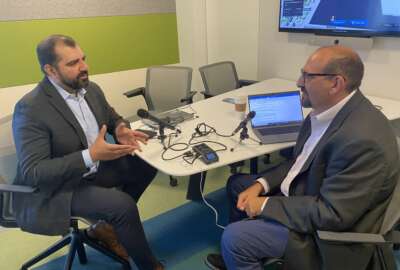GSA CIO, IG spar over purchase of China-made video conferencing cameras
Lawmakers took GSA to task for purchasing 150 China-made video conferencing cameras in 2022, calling it "a very troubling episode."
The General Services Administration’s top IT official says GSA did not violate the law when it bought more than 100 China-made video conferencing cameras in 2022 as part of a pilot project.
GSA Chief Information Officer David Shive also says nobody at the agency intentionally misled the contracting officer into approving the purchases.
GSA’s deputy inspector general, however, says officials in the agency’s Office of Digital Infrastructure Technologies (IDT) supplied the contracting officer with “egregiously flawed information” to approve the purchase. Deputy IG Robert Erickson Jr. also maintains that the purchase violated the Trade Agreements Act of 1979.
The issue, simmering since the IG issued its report on the purchases in January, came to a head during a hearing on Thursday before the House Oversight and Accountability subcommittee on cybersecurity, information technology and government innovation committee.
“As stewards of federal IT procurement government wide, GSA especially must show preeminent expertise and diligence in buying the right it to ensure government works and is secured,” Ranking Member Gerry Connolly (D-Va.) said. “While GSA has made the case they’ve not violated any laws, the American people deserve to know why they piloted products that would not have complied with the Trade Agreements Act if they were bought at the amount necessary to serve the full organization.”
The IG’s report centers on two separate transactions occurring in March and October of 2022, respectively. GSA purchased a total of 150 video conference cameras from Owl Labs, which manufactured their video conferencing cameras in China until mid-2023.
Shive said GSA’s decision to pilot the Owl Labs cameras was based on their “unique capability of a 360-degree view and portability.”
“It also required no installation, was compact and easy to relocate and store and was one of the least expensive among the options,” Shive said.
The IG report found that “at least” one alternative existed that was manufactured in a TAA-compliant country. But “the market research provided to the contracting officer did not include information on this alternative,” the report states.
Shive maintained that the Owl Labs cameras were the only devices that met GSA’s requirements. He conceded that GSA could have done a better job documenting its requirements.
“We did a fulsome analysis of the market research, interviewed the people involved, and determined that nobody intentionally misled the contracting officer,” Shive said. “We said, ‘Okay, this is a training opportunity.’ So we’ve trained not only this person, but corresponding staff in two ways. One, we’ve given them training on [Buy American Act] and TAA compliance. And the other is we’ve trained them on what proper market research would look like, specifically documentation.”
He also said GSA has taken steps to ensure that the cameras operated securely.
“In line with our security protocols, GSA voluntarily removed older Owls from use that the vendor indicated would no longer be supported,” Shive said. “For the remaining devices, our security assessment determined that the cyber security risks were low. GSA chose to intentionally configure them for use in a more limited manner in order to further reduce any potential vulnerabilities.”
A spokesperson for Owl Labs said the company’s “core products” are now made in Vietnam.
“Prior to mid-2023, Owl Labs worked with a leading, multinational contract manufacturer in China, as many large U.S. companies do,” the spokesperson said. “No security breaches have ever occurred or been reported among customers using Owl Labs products. Owl Labs devices never record, collect, transmit or store any video or audio data from any meetings. We regularly conduct penetration testing of our software and hardware to ensure they meet industry security standards.”
GSA, IG disagree over TAA compliance
Shive further argued the purchases did not violate the TAA since even taken together the procurement didn’t meet the threshold of $183,000 required to invoke TAA compliance. He also said GSA has no intention to purchase any more Owl Labs cameras.
But Erickson Jr. pushed back on that response, arguing the pilot program was meant to lead to a larger procurement.
“This was going to be a bigger purchase,” he said. “It was going to be scaled up to purchase a lot of Chinese video cameras.”
Connolly also took a dim view of Shive’s statement.
“You’ve already got GSA employees saying there was no other product,” Connolly said. “So that would argue no, once we have the pilot, we’re going to scale up with this product. There seemed to be no sensitivity or care that it was Chinese and that there was security concerns inherent in a Chinese camera, because we have experienced that with other Chinese technologies. Red lights had to go on. And it was in violation, frankly, of U.S. government policy. And that’s strange, given the fact that you’re the General Service Administration charged with this very mission for on behalf of the federal government.”
“It’s a very troubling episode,” Connolly added.
Subcommittee Chairwoman Nancy Mace (R-S.C.) illustrated broader concerns about buying technology manufactured in China.
“To think that buying Chinese equipment that could be used to spy on us and our government is a good idea, is a terrible idea, and I hope that you never do it again,” Mace said to Shive during her closing remarks. “And I hope you get rid of what you have and give it to somebody else. Maybe give it to Russia, because I don’t want that stuff in our federal government or in our agencies.”
Copyright © 2024 Federal News Network. All rights reserved. This website is not intended for users located within the European Economic Area.
Follow @jdoubledayWFED






